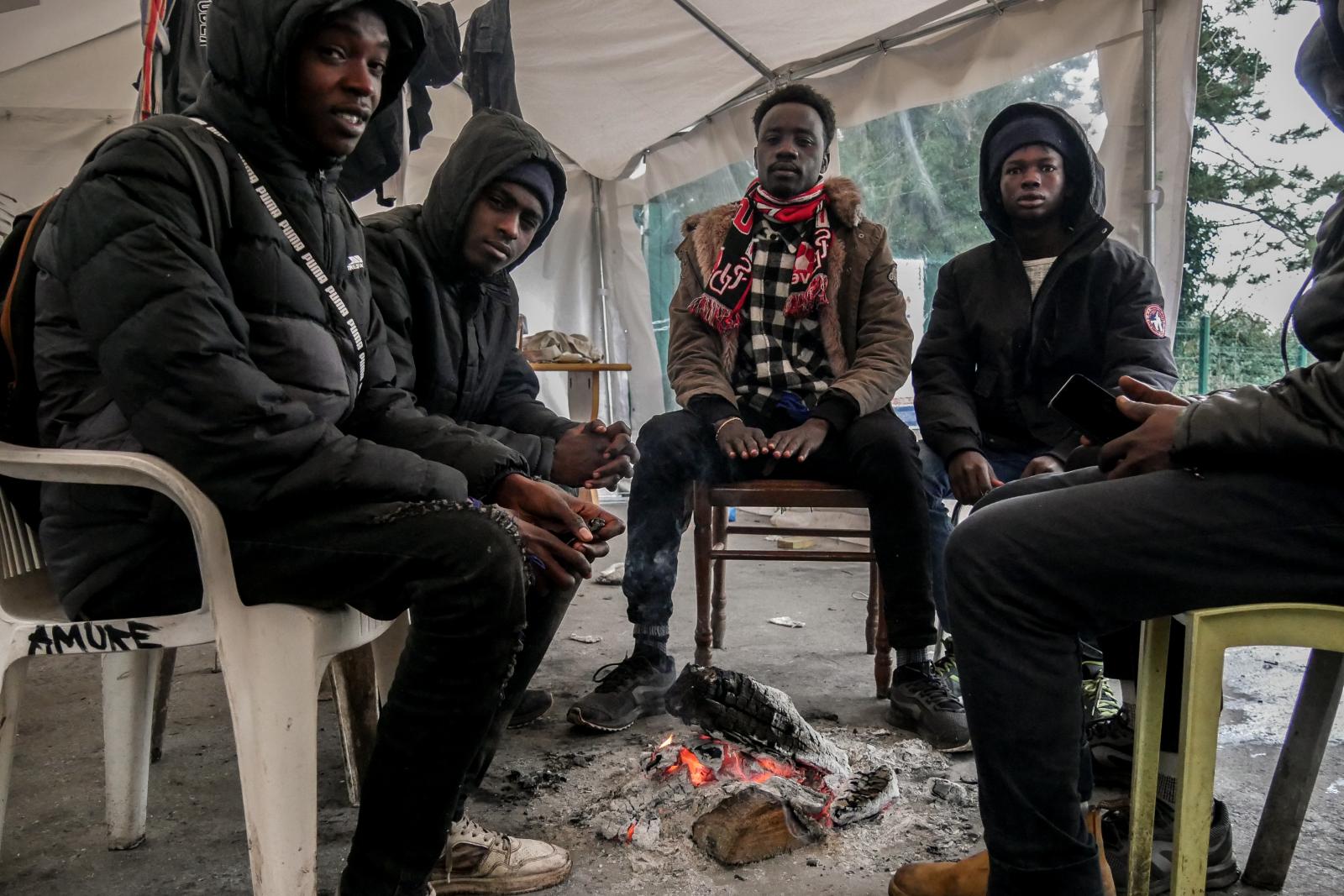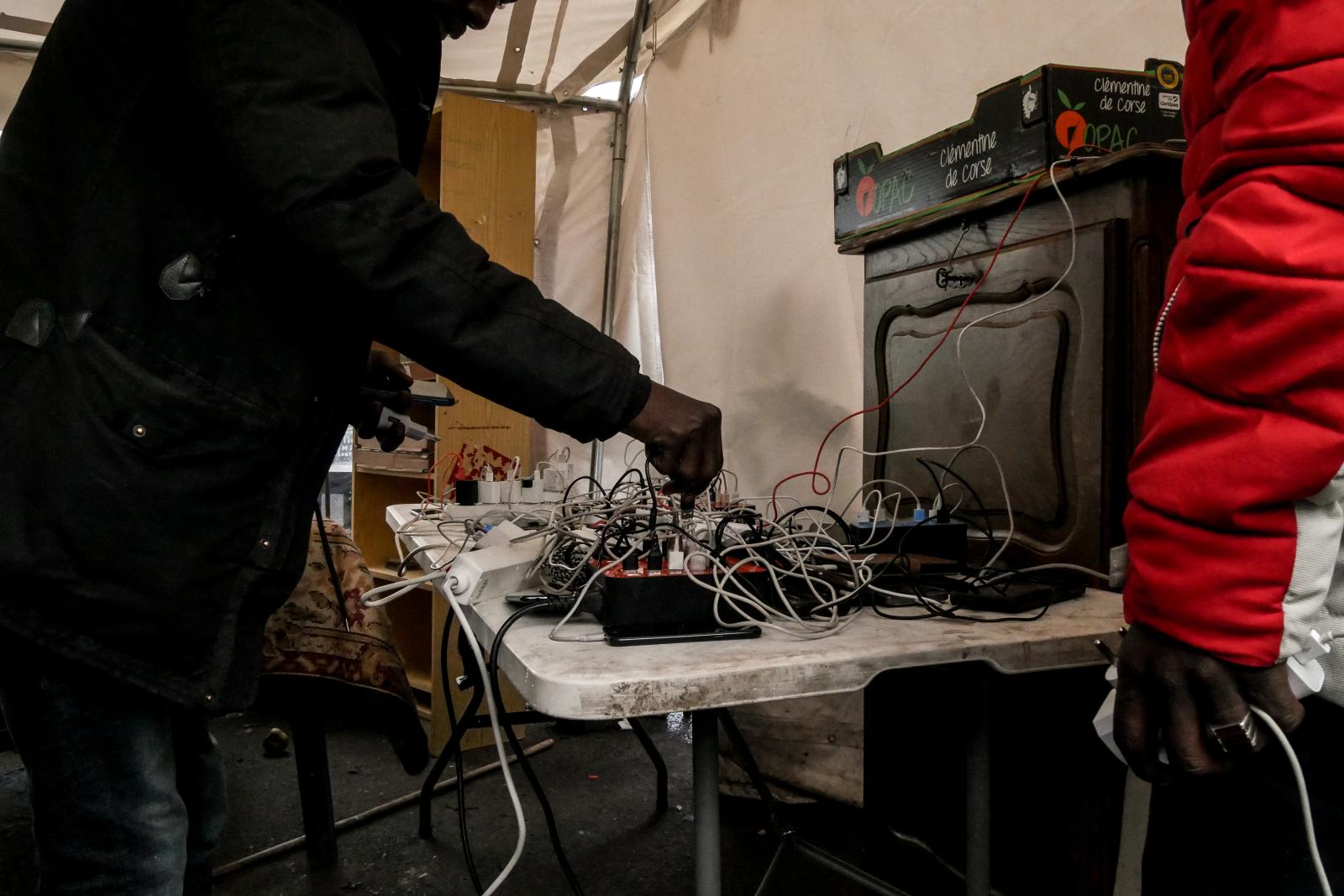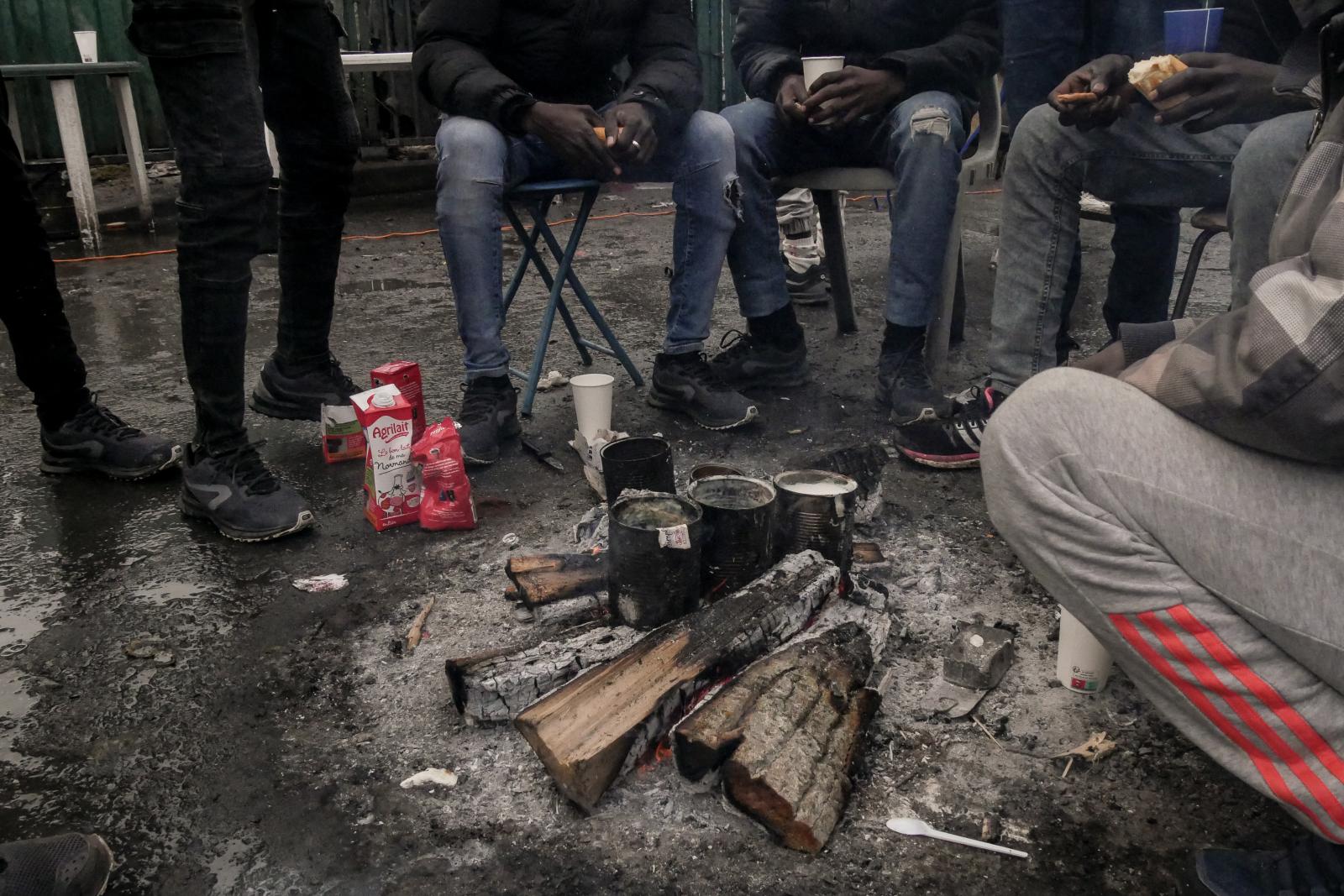Public Project
A Ouistreham, la lutte pour l'accès à l'eau
Ce vendredi à midi, lorsque le camion de l’association Vents contraires arrive sur le quai Charcot, à 1 kilomètre du port commercial de Ouistreham, il fait 5 degrés et le vent souffle en rafales. Deux jours par semaine, l’association apporte une aide logistique à la centaine d’hommes soudanais qui vivent sur place. Si les recharges de crédit internet et l’accès à l'électricité sont les bienvenus, c’est surtout la possibilité de se doucher à l’eau chaude qui redonne le sourire, alors que nous sommes à quelques jours de l'hiver. Il faut rappeler que depuis l'installation du campement il y a 3 ans, l’accès à l’eau a toujours été difficile pour toutes les personnes qui y ont vécu. En octobre 2022, l’ONG Solidarités internationale, qui intervient également sur le site, préconisait dans son rapport “ Diagnostic social: Eau, Hygiène et assainissement” l’installation de douches, de sanitaires et d’un point d’eau au camp. Près d’un an plus tard et face à l’absence de réaction de la mairie de Ouistreham et de la Préfecture du Calvados, plusieurs associations et collectifs, dont Vents contraires, ont saisi en juin le juge des référés du tribunal de Caen. Elles demandent la mise en place d’infrastructures afin de permettre un accès digne et salubre à l’eau pour les personnes exilées. La juridiction administrative a ordonné à la mairie ainsi qu’à la Préfecture d’agir et en juin : un WC chimique et un point d’eau avaient été installés, insuffisants pour la centaine de personnes sur place. Le Conseil d’Etat avait dû trancher en juillet dernier, (CE, 3 juillet 2023, Nos 475136, 475262) [note de bas de page] en rejetant l’appel de la mairie de Ouistreham et en ordonnant l’application de l’ordonnance précédente, qui demandait à ce que les associations soient consultées pour la mise en place d’installations sanitaires adaptées. Depuis, deux WCs et deux douches ont été installées à la demande de la DDETS du Calvados, qui s’est substituée à la mairie. Celle-ci ne souhaite pour l’instant ni dialoguer avec les associations, ni prendre à sa charge les installations et leur adaptation aux besoins des personnes exilées. En attendant, et malgré le risque d’une amende forfaitaire journalière décidée par le Conseil d’Etat, de nouveau saisi face à l’absence d’application de l'ordonnance de juillet (CE, 1er décembre 2023, N° 487539) [note de bas de page], les personnes présentes sur le campement sont toujours dans une situation sanitaire grave. Pour Ahmed, jeune soudanais de 23 ans, “la situation est très compliquée car il n’y a pas d’eau chaude et tous les toilettes sont condamnés”. Chaque jour, les hommes sont obligés de se contenter du simple robinet d’eau froide pour la vaisselle et leur toilette quotidienne. En fin de journée, la mairie a tenu pour la première fois depuis le début du litige une réunion en présence des associations pour tenter de trouver une solution à cette situation. Johanès Si Mohand, coordinateur de l’association Vents Contraires, espère que “les engagements oraux pris par la mairie pour une mise en conformité des installations d’ici la fin de l’année seront tenus”. Un espoir, mais également un regret d’avoir dû tant batailler alors qu’une solution aurait pû être envisagée il y a bien longtemps si les pouvoirs publics avaient accepté de travailler main dans la main avec les associations.
En partenariat avec les ONGs Vents Contraires et Solidarités International
ENGLISH- December 15, 2023, in Ouistreham, Quai Charcot
This Friday at noon, as the truck from the association Vents Contraires arrives at Quai Charcot, about one kilometer from the commercial port of Ouistreham, the temperature is 5°C, and the wind is gusting. Twice a week, the association provides logistical support to around one hundred Sudanese men living in the area. While the provision of internet credit and access to electricity is appreciated, it is the opportunity to take a hot shower that brings smiles, especially with winter just around the corner. Since the camp was established three years ago, access to water has always been a challenge for its residents. In October 2022, the NGO Solidarités International, which also operates on the site, recommended in its report, Social Diagnosis: Water, Hygiene, and Sanitation, the installation of showers, toilets, and a water access point in the camp. Nearly a year later, facing the lack of action from the Ouistreham municipality and the Calvados Prefecture, several associations and collectives, including Vents Contraires, filed an urgent appeal in June with the Caen administrative court. They demanded the installation of infrastructure to provide exiled people with dignified and sanitary access to water. The administrative court ordered both the municipality and the Prefecture to act, and by June, a chemical toilet and a water point were installed. However, these were inadequate for the hundred or so people on-site. The Council of State had to intervene in July (CE, July 3, 2023, Nos. 475136, 475262), rejecting the municipality's appeal and enforcing the previous court order, which required consultation with associations to establish appropriate sanitary facilities. Since then, two toilets and two showers have been installed at the request of the Calvados Departmental Directorate of Employment, Labor, and Solidarity (DDETS), which took over from the municipality. However, the municipality has refused to engage in dialogue with the associations or take responsibility for the installations and their adaptation to the exiles' needs. Meanwhile, despite the threat of a daily penalty imposed by the Council of State—once again petitioned due to the failure to comply with the July order (CE, December 1, 2023, No. 487539)—the people in the camp remain in a dire sanitary situation. For Ahmed, a young Sudanese man of 23, “the situation is very complicated because there is no hot water, and all the toilets are locked.” Every day, the men must make do with a single cold-water tap for washing dishes and personal hygiene. Later that day, the municipality held its first meeting with the associations since the start of the dispute, attempting to find a solution to this crisis. Johanès Si Mohand, coordinator of Vents Contraires, hopes that “the verbal commitments made by the municipality to bring the facilities into compliance by the end of the year will be honored.” While hopeful, he also regrets the prolonged struggle, pointing out that a solution could have been implemented long ago if public authorities had been willing to work hand-in-hand with the associations.
In partnership with the NGOs Vents Contraires and Solidarités International
539











































